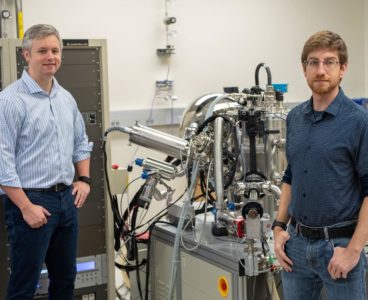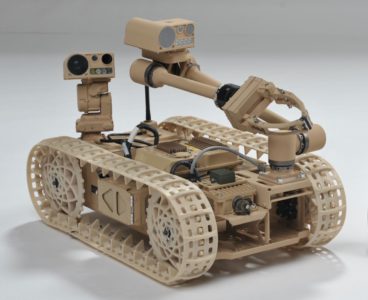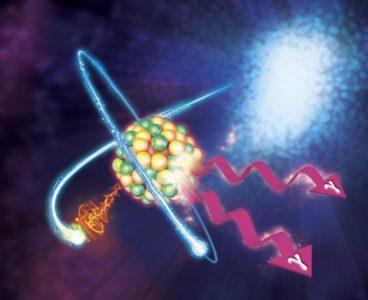Soldiers carrying 15-25 pounds of batteries could carry batteries a fraction of the weight but with the same energy and improved safety, a new study shows. In the latest issue of the journal Nature, researchers at the U.S. Army Combat Capabilities Development Command’s Army Research Laboratory, the Army’s corporate research laboratory known as ARL, and…
Discovery May Lead to New Materials For Next-Generation Data Storage
Research funded in part by the U.S. Army identified properties in materials that could one day lead to applications such as more powerful data storage devices that continue to hold information even after a device has been powered off. A team of researchers led by Cornell University and the University of California Berkeley made a…
U.S. Army Research Lab’s Top 10 Coolest Science, Tech Advances from 2018
This year has had its share of science and technology advances from Army researchers. The RDECOM Research Laboratory, the Army’s corporate research laboratory (ARL), has the mission to discover, innovate and transition science and technology to ensure dominant strategic land power. The lab’s chief scientist, Dr. Alexander Kott, handpicked the “coolest” advances to showcase what…
Army Scientists Revolutionize Cybersecurity Through Quantum Research
Scientists at the RDECOM Research Laboratory, the Army’s corporate research laboratory (ARL) have found a novel way to safeguard quantum information during transmission, opening the door for more secure and reliable communication for warfighters on the battlefield. Recent advancements of cutting-edge technologies in lasers and nanophysics, quantum optics and photonics have given researchers the necessary…
Army Scientist Seeks Enhanced Soldier Systems Through Quantum Research
Researchers at the U.S. Army Research Laboratory and the Joint Quantum Institute have created a pristine quantum light source that has the potential to lead to more secure communications and enhanced sensing capabilities for Soldiers. ARL’s Dr. Elizabeth Goldschmidt and JQI’s Dr. Sunil Mittal and Prof. Mohammad Hafezi discuss this research in their paper titled…
Army Scientists Develop Computational Model to Predict Human Behavior
Army Researcher Minimizes the Impact of Cyber-Attacks in Cloud Computing
Army Research Lights the Way for New Materials
What happens when gold and silver just don’t cut it anymore? You turn to metallic alloys, which are what Army researchers are using to develop new designer materials with a broad range of capabilities for our Soldiers. This is exactly what scientists Dr. David Baker and Dr. Joshua McClure from the U.S. Army Research Laboratory…
If Military Robot Falls, It Can Get Itself Up
Scientists at the U.S. Army Research Laboratory and the Johns Hopkins University Applied Physics Laboratory have developed software to ensure that if a robot falls, it can get itself back up, meaning future military robots will be less reliant on their Soldier handlers. Based on feedback from Soldiers at an Army training course, ARL researcher…
Army Scientists Create New Technique for Modeling Turbulence in the Atmosphere
Army researchers have designed a computer model that more effectively calculates the behavior of atmospheric turbulence in complex environments, including cities, forests, deserts and mountainous regions. This new technology could allow Soldiers to predict weather patterns sooner using the computers at hand and more effectively assess flight conditions for aerial vehicles on the battlefield. Turbulence…
Army Researchers Teaching Robots to be More Reliable Teammates for Soldiers
Researchers at the U.S. Army Research Laboratory and the Robotics Institute at Carnegie Mellon University developed a new technique to quickly teach robots novel traversal behaviors with minimal human oversight. The technique allows mobile robot platforms to navigate autonomously in environments while carrying out actions a human would expect of the robot in a given…
Army Scientists Have a Blast With Aluminum Nanoparticles
Army scientists proved a decades-old prediction that mixing TNT and novel aluminum nanoparticles can significantly enhance energetic performance. This explosive discovery is expected to extend the reach of U.S. Army firepower in battle. Researchers from the U.S. Army Research Laboratory and Texas Tech University demonstrated up to 30-percent enhancement in the detonation velocity of the…
Artificial Intelligence Helps Soldiers Learn Many Times Faster in Combat
New technology allows U.S. Soldiers to learn 13 times faster than conventional methods and Army researchers said this may help save lives. At the U.S. Army Research Laboratory, scientists are improving the rate of learning even with limited resources. It’s possible to help Soldiers decipher hints of information faster and more quickly deploy solutions, such…
Army Researcher Uses Math to Uncover New Chemistry
In the future, materials scientists will use advanced software to specify the properties they desire and a program will deliver a choice of optimized chemical compounds. Dr. B. Christopher Rinderspacher, a theoretical chemist with the U.S. Army Research Laboratory, recently published a paper describing the process of using mathematics to design chemical compounds by reducing complexity…
Army Develops Face Recognition Technology that Works in the Dark
Army researchers have developed an artificial intelligence and machine learning technique that produces a visible face image from a thermal image of a person’s face captured in low-light or nighttime conditions. This development could lead to enhanced real-time biometrics and post-mission forensic analysis for covert nighttime operations. Thermal cameras like FLIR, or Forward Looking Infrared,…
Army-Led Effort Demos New Atomic Effect for Potential Isotopic Battery
A multinational research team led by Army scientists successfully induced a controlled release of stored isotopic energy using a physical effect involving atomic electrons that was proposed more than 40 years ago but never before demonstrated experimentally. Scientists said this significant scientific achievement marks a step in the Army’s quest to find and access alternative…
Environmentally Safe Red Glare Rocket Changes Fireworks, Soldier Technology
Researchers at the U.S. Army Research Laboratory and the Ludwig Maximilian University in Munich, Germany have developed an environmentally-friendly red light flare popular in fireworks displays and among Soldiers who use them in training and battlefield operations as signaling devices. The formula is a lithium-based red-light-emitting pyrotechnic composition of high purity and color quality, and…
Army Partners with Marine Corps on 3D Printed Drones
Army researchers are working with the Marines to develop 3-D printed drones as materials science, aviation technology and software development merge to deliver new capabilities. “Several years ago when we were collaborating with our academic partner, Georgia Tech, we had this project where we were focusing on design engineering of small unmanned aircraft systems,” said…
Army Scientist Studies Thunderstorms to Improve Battlefield Missions
Battlefield Internet Technologies, Interconnected Robots Focus of New Army Programs
Army Refines Recipe for Quantum-Enhanced Technologies
The U.S. Army Research Laboratory and its partners have made a breakthrough in understanding the structure of entanglement in quantum systems with long-range interactions. Entanglement, researchers say, is a crucial resource that can be harnessed for ultra-secure communication, “fantastically precise” measurement, exquisite clocks and other timekeeping, as well as computers with unprecedented power. Quantum mechanics,…
New Study Challenges Long-Accepted Views on Human-Autonomy Interaction
A team of Army scientists and engineers have challenged long-held views in the area of human-autonomy interaction to change the way science involves people, especially in developing advanced technical systems that involve artificial intelligence and autonomy. As part of a research program initially funded in 2013 by the Office of the Secretary of Defense, U.S.…
Researchers Develop Water-Based Lithium-Ion Batteries That Don’t Explode
Researchers at the U.S. Army Research Laboratory and the University of Maryland have developed for the first time a lithium-ion battery that uses a water-salt solution as its electrolyte and reaches the 4.0 volt mark desired for household electronics, such as laptop computers, without the fire and explosive risks associated with some commercially available non-aqueous…





















